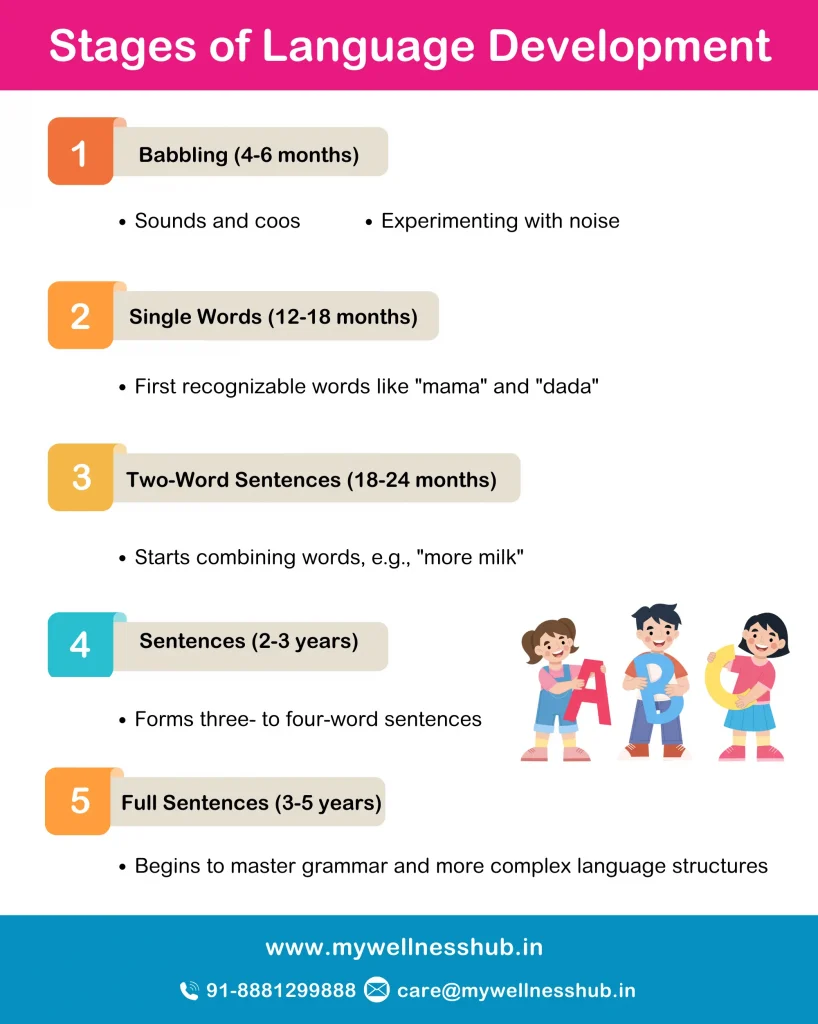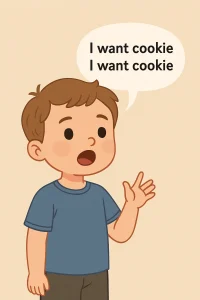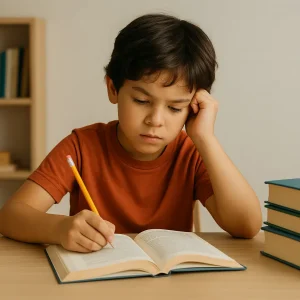Science Behind Language Development: How Kids Learn to Communicate
By Wellness Hub
Last Updated: December 4, 2024
Language development is a crucial journey that begins from birth, shaping a child’s ability to communicate and understand the world. For parents and educators, understanding this process is essential, as it impacts a child’s academic success and social skills. Engaging with children to enhance their language skills not only boosts their cognitive development but also builds their confidence. This guide will explore the key stages and factors of kids language development, providing practical insights to support your child’s communication journey effectively.
Take the First Step Toward Your Child’s Success with Our Home Therapy Resources
Foundations of Language Development in Children
The Role of Brain Development
Language skills start to form in the brain from a very young age. Key areas like the Broca’s area help with speaking and the Wernicke’s area with understanding. As children listen and try to speak, these brain parts get better at working with each other, facilitating kids language development. This growth is why it’s so important for kids to have a rich environment that encourages talking and listening, supporting their ongoing communication skills enhancement.
Genetic and Biological Influences
Genes play a role in how children learn to talk. Some kids might inherit difficulties with language, like dyslexia, while others might excel. Biological factors, like how well a child can hear, also affect language learning. Early hearing tests are crucial because hearing problems can delay how kids develop speech. Knowing about these genetic and biological factors helps us find ways to help each child improve their language skills effectively.
Also read: Language Development Stages in Children: A Parent’s Guide
Milestones in Early Language Learning

From Babbling to Words
Children start their language journey with simple sounds and babbles. This early stage is important because it helps them practice the sounds they hear around them. By their first birthday, many kids begin to say basic words like “mama” or “dada.” These first words are big milestones because they show that children are starting to connect sounds with meanings.
Building Vocabulary and Grammar
After mastering initial words, children quickly progress in their language skills. By age two, they often start putting two words together, like “more milk” or “go park,” indicating the beginning stages of understanding language rules and grammar. This is a crucial part of kids language development. As they grow and are exposed to more language, their sentences become longer and more complex. Actively encouraging this development through reading and conversation can greatly enhance their vocabulary and grammar skills, supporting their overall communication abilities.
Environmental and Social Factors Affecting Language Development
Impact of Family Interaction
The role of family in a child’s language development cannot be overstated. When parents engage actively in their child’s speech from an early age, the benefits to kids’ language development are immense. Responsive conversations, where parents listen and reply to their child’s vocalizations and early words, help build a child’s vocabulary and communication skills. Regular reading, singing, and playful talking also play significant roles. These interactions introduce children to new words, teach them about conversation turns, and provide them with the confidence to express themselves. Parents who talk and listen actively to their children create a supportive environment that is conducive to enhancing kids’ language development.
Role of Educational Settings
Educational settings, including preschools and daycare, significantly enhance language development as well. These environments provide structured language learning opportunities that are hard to replicate at home. Through group activities, guided play, and structured classroom interactions, children learn to communicate effectively with peers and adults outside their family. Teachers in these settings use specific strategies to introduce new vocabulary, encourage sentence building, and promote linguistic creativity, which are vital for children’s language growth. The social setting of a classroom or preschool also challenges children to use language to solve problems, negotiate play, and build relationships, further enhancing their communicative abilities.
Challenges and Interventions in Language Development
Identifying and Addressing Delays
Spotting language delays early is key to helping children catch up. Signs to watch for include not babbling by the first birthday, having fewer than 50 words by two years old, or struggling to make sentences at three years. If you notice these signs, simple steps like talking more to your child, reading together, and engaging in play that encourages language use can help. These activities should be fun and part of everyday routines, helping children improve naturally and comfortably.
Speech Therapy and Rehabilitation
For children who need extra help, speech therapy offers targeted support. Speech therapists use various techniques, such as exercises to improve how clearly a child speaks, activities to build vocabulary, and games that make therapy enjoyable. Wellness Hub provides resources that therapists and parents can use to make these sessions more effective. With regular practice and the right guidance, speech therapy can significantly boost a child’s communication skills, giving them the confidence to express themselves more clearly.
Conclusion
Understanding how kids develop language is crucial—it helps them become confident communicators and eager learners. At Wellness Hub, we turn science into practical tools and resources to support this important growth. Explore our easy-to-use materials and interactive tools that make learning fun and effective. Check out our latest guides, or chat with our experts for tailored advice. Join our community at Wellness Hub to help your child thrive in communication and beyond. Visit us today and start building a strong language foundation for your child. Together, we can make a big difference in their world!
Frequently Asked Questions:
1. What age should a child start talking?
Most children say their first meaningful words between 12 and 18 months of age. Common first words include “mama” and “dada.” However, each child develops at their own pace, and some might start speaking earlier or later.
2. How can I help my child develop language skills?
Engage with your child throughout the day by talking about your activities, reading storybooks, and playing interactive games that involve naming objects and describing actions. Consistent engagement helps build vocabulary and comprehension skills.
3. What are signs of language development delays?
Signs of potential delays include not babbling by 12 months, not using single words by 16 months, or not being able to form two-word phrases by 24 months. If your child seems unusually quiet or struggles with understanding simple instructions, these could also be signs of a delay.
4. Why is early language development important?
Early language skills are crucial for later success in school and overall cognitive development. They also play a significant role in social interactions, emotional regulation, and problem-solving abilities.
5. Can screen time affect a child’s language development?
While some educational programs can be beneficial, excessive screen time can reduce the amount of time children spend interacting with others, which is essential for developing communication skills. It’s important to balance screen time with interactive activities.
6. What role do parents play in language development?
Parents are their child’s first teachers. By conversing, reading, and playing with their children, parents can significantly influence their child’s language acquisition. Regular, everyday interactions filled with rich language content are beneficial.
7. How does interaction with other children affect language skills?
Interacting with peers teaches children how to use language in social settings, helping them learn conversational norms, enhance their vocabulary, and understand the pragmatic aspects of language like jokes and sarcasm.
8. What is the difference between speech and language development?
Speech development focuses on the physical ability to pronounce sounds and words correctly, involving the coordination of the lips, tongue, and breath. Language development involves understanding and using words and sentences to communicate ideas and feelings.
9. When should I seek professional help for my child’s language development?
If your child shows signs of delay in speech or language milestones, or if you have concerns about their hearing or understanding of language, consulting a speech-language pathologist can provide guidance and potential intervention strategies.
10. How does wellnesshub support children’s language development?
mywellnesshub offers a variety of resources tailored to foster language development, from interactive apps designed to make learning fun to workshops for parents that provide strategies for supporting communication skills at home. Our tools are based on the latest research and best practices in speech and language therapy.
About the Author:
Rajini Darugupally
M.Sc., Speech-Language Pathologist (9+ years of experience)
Rajini is a passionate and dedicated Speech-Language Pathologist with over 9+ years of experience, specializing in both developmental speech and language disorders in children and rehabilitation in adults. Currently, at Wellness Hub, she thrives in a team environment that values innovation, compassion, and achieving results for their clients.
Book your Free Consultation Today
Parent/Caregiver Info:
Client’s Details:
* Error Message








